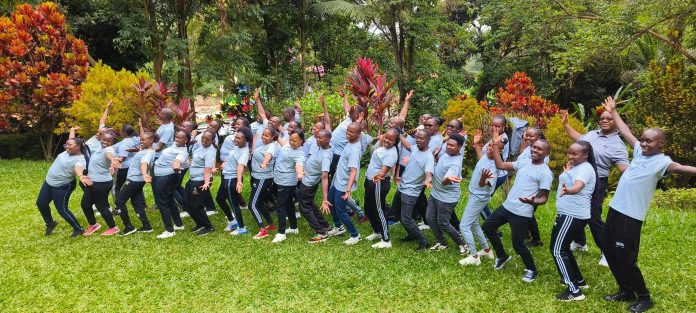By Amos Wachira
When it comes to trans-formative micro-lending, no one does it better than Jawabu Biashara, a credit-only microfinance institution targeting micro and small enterprises with innovative financial solutions. Founded in 2018, Jawabu Biashara’s relentless focus on impactful lending has seen it create innovative products and services, emerging as a formidable player in Kenya’s competitive and rapidly evolving microfinance sub-sector.
Looking at the micro and small enterprises that Jawabu Biashara has financed over the years, there is no denying that their lending model has turned around the fortunes of many.
By Aligning their business model with the United Nations Sustainable Development Goals, Jawabu Biashara stands out in the crowded marketplace.
“Our trading name, Jawabu in Kiswahili translates to “solution or an answer” and that’s what we strive to offer innovatively in the Kenyan market. The name touches on the mandate we have set for ourselves: To be an answer to our target group, the micro business community. We are alive to the fact that this is not an event, but a journey that started with the very initial loan we gave our first customer in Githurai back in 2018,” says Charles Njoroge, Managing Director, Jawabu Biashara.
Microfinance became famous through Muhammad Yunus’ Grameen Bank, which is considered as one of the largest microfinance institutions in the world. As of today, the Grameen Bank serves over 45 million people through its 10.7 million borrowers who have access to micro-credit for investments or emergencies, with 97% of them women.
In Kenya, innovative micro credit organizations like Jawabu Biashara look beyond lending when creating solutions for their customers. Jawabu Biashara’s biodigestor loan is emerging as a popular choice for farmers, thanks to its practicality.
When we visited small scale dairy farmers in Kiambu County, we saw the life changing power of microfinance in action, thanks to Jawabu Biashara’s Biodigestor loans.
Biodigestor loans enable farmers to install biogas digesters that convert animal waste into clean cooking fuel. This reduces reliance on firewood and charcoal, curbing deforestation and respiratory diseases.
“We work with many farmers especially in SDG#7 – Affordable and clean energy. The clean cooking space, especially the roll out of Biodigestor credit has in many ways brought a healthy cooking alternative to our customers, improved on forest cover protection and ensured there is uptake of organic farming via production of Bioslurry.”
In the fast-evolving world of microfinance, Mr. Njoroge emphasizes the need for innovation. “What worked yesterday, may struggle to work today,” he shares.
He says that in the 90s, implementing the Grameen lending methodology that favored group based loans was the fashion, talking of peer pressure, co-guarantee arrangements and frequent weekly engagements worked for lending organizations and many of the institutions thrived. Today, with the mobile revolution, access to financial solutions anywhere, any time is the norm.“That is why we build products and services that answer to the needs of our customers.”
Jawabu Biashara’s lending model revolves around field officers who work closely with the customer to understand their financial needs.
In Kiambu County, the impact of biodigestor credit has been immediate. Farmers now enjoy energy independence. Biogas systems allow farmers to produce their own energy on-site, reducing their reliance on external energy sources and mitigating the impact of fluctuating energy prices. By generating energy from waste materials like animal manure, farmers have significantly lowered their energy expenses, potentially increasing overall profitability.
In addition, Biogas processes produce nutrient-rich residues that can be used as organic fertilizers, enhancing soil fertility and reducing the need for chemical fertilizers.
Farmers also benefit from carbon sequestration as these biodigestor systems capture and utilise carbon that would otherwise be released into the atmosphere.
For most farmers, a biogas digestor is a bridge too far, mainly due to the upfront initial costs of installation. With Jawabu Biashara, they can now install biogas digestor systems and herald a new chapter of clean energy for cooking.
By partnering with reputable biogas digestor manufacturers, they remove the financial barriers, allowing small scale farmers to enjoy the many benefits associated with biogas. With such a profound impact, it’s not hard to see why Jawabu Biashara is scaling the biogas loans to other counties.
“From humble beginnings, today we operate in over 11 counties offering a buffet of financial solutions. Scale and digital engagement fits very well to our strategic direction to not only offer branch-less expansion, but occasionally anchor some brick and mortar expansion based on an in-house expansion criteria.”
The microfinance institution is also gaining traction in provision of water tank loans, one of their key loan products that aligns with the SDG 6 (Clean water and sanitation for all)
Erratic rainfall and unreliable municipal water supply makes water storage crucial for agriculture and enterprise. Jawabu’s water tank loans help farmers and entrepreneurs to purchase water tanks, ensuring year-round supply of water for irrigation, domestic and commercial use.
“From an impact point of view, when your customer can “ touch and feel” the institution credit due to the benefits that have accrued, then this fits well into our brand promise of: Finance. Empower and Transform,” says Mr. Njoroge.
Microfinance continues to be a game-changer in Africa, lifting millions out of poverty and fostering sustainable development. In Kenya, institutions like Jawabu Biashara are leading the charge with innovative, client-focused solutions that go beyond traditional lending.
“We work for a good bottom line, just like any one else, but we are proud to say we deliver impact, we deliver over 9 of the 17 UN SDGs ( sustainable development goals) and this fits well to our brand promise of Finance, Empower and Transform,” shares Mr. Njoroge.
Over the last decade, microfinance has been at the forefront of disruption in developing countries as well as expanding opportunities to the poor and excluded population. To accelerate economic progress on the continent, there has been no better time for stakeholders to start being more deliberate in maximizing the impact of microfinancing.
“We have already disrupted the market with our clean energy solutions and we still have a huge constituency to reach out to. In the next decade and beyond, Jawabu will be a key player in the microfinance sector in Kenya,” says the Managing Director.
By supporting small businesses, promoting clean energy, and improving water access, Jawabu Biashara is transforming lives.

















